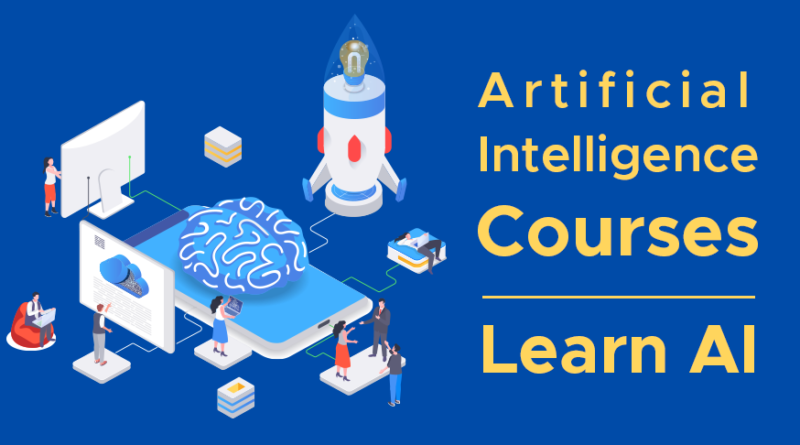The Ultimate Guide to Choosing the Right AI Course for Your Career
Artificial Intelligence (AI) has become a buzzword in the job market, with businesses and industries across the globe increasingly relying on AI technologies to streamline their operations and make data-driven decisions. This growing demand for AI professionals has led to a surge in AI courses and programs designed to equip individuals with the necessary skills and knowledge. However, with the plethora of options available, choosing the right AI course for your career can be a daunting task. This ultimate guide aims to demystify the process and help you make an informed decision.
Why Pursue an AI Course?
Before delving into the steps of choosing the right AI course, it’s essential to understand why investing in AI education is valuable for your career. AI is transforming various industries, from healthcare and finance to marketing and entertainment. Here are some compelling reasons to consider pursuing an AI course:
- High Demand for AI Talent: The job market for AI professionals is booming, with companies seeking skilled individuals to develop AI systems, analyze data, and solve complex problems.
- Lucrative Salaries: AI professionals often command high salaries due to their specialized skills. A report from Indeed in 2021 stated that AI engineers’ average salary in the United States was over $150,000.
- Innovation and Growth: AI plays a crucial role in shaping the future, making it a dynamic and innovative field. You can be at the forefront of technological advancements by pursuing a career in AI.
- Diverse Career Opportunities: AI professionals are needed in various roles, including machine learning engineer, data scientist, AI researcher, and AI ethics consultant, among others.
- Global Impact: AI has the potential to address significant global challenges, such as healthcare, climate change, and social justice. By working in AI, you can contribute to meaningful solutions.
How to Choose the Right AI Course
Selecting the right AI course is a critical decision that will influence your career path. Here are the steps you should follow to make an informed choice:
1. Define Your Career Goals:
- Before embarking on your AI education journey, determine your career objectives. Do you want to become a machine learning engineer, a data scientist, or an AI researcher? Understanding your goals will help you select the most suitable course.
2. Understand the Basics:
- Familiarize yourself with the foundational concepts of AI, such as machine learning, deep learning, natural language processing, and computer vision. This knowledge will be invaluable when evaluating different courses.
3. Research Different Courses:
- Conduct thorough research on AI courses and programs available online, at universities, and through coding bootcamps. Consider factors like course content, duration, delivery format, and cost.
4. Accreditation and Reputation:
- If you’re considering formal education, look for accredited universities and institutions known for their AI programs. Additionally, read reviews and seek recommendations from industry professionals to gauge a program’s reputation.
5. Course Curriculum:
- Examine the course syllabus carefully. It should cover a broad range of AI topics, including algorithms, data preprocessing, model training, and ethical considerations. Choose a course that aligns with your career goals and interests.
6. Faculty Expertise:
- For formal education, check the qualifications and expertise of the faculty. Professors and instructors with experience in AI research and industry can provide valuable insights and mentorship.
7. Hands-On Experience:
- Practical experience is crucial in AI. Look for courses that offer hands-on projects, labs, and real-world applications. Practical work will help you apply theoretical knowledge effectively.
8. Learning Resources:
- Ensure the course provides access to learning resources such as libraries, datasets, and software tools. The availability of these resources will facilitate your learning and research.
9. Flexibility and Accessibility:
- Consider your schedule and location when choosing a course. Many AI courses are available online, allowing you to learn at your own pace and from anywhere in the world.
10. Industry Connections: – Some courses have strong industry connections and provide opportunities for internships or networking. These connections can lead to job placements and collaborations.
11. Cost and Financial Aid: – Assess the cost of the course and explore options for financial aid, scholarships, or employer-sponsored programs. Consider the return on investment in terms of future job opportunities and earning potential.
12. Stay Updated: – The field of AI is rapidly evolving. Look for courses that emphasize continuous learning and staying updated with the latest trends and technologies.
13. Specialization and Electives: – Some AI courses offer specializations or electives that allow you to focus on specific areas, such as computer vision or natural language processing. Choose a course that aligns with your interests.
14. Alumni Success: – Research the career outcomes of a course’s alumni. The success of past students can be a good indicator of the program’s quality and relevance.
15. Ethical Considerations: – With the growing importance of AI ethics, consider courses that include modules or discussions on the ethical aspects of AI and its societal impact.
16. Trial Period: – Some online courses offer trial periods or free introductory modules. Take advantage of these to get a sense of the course content and teaching style.
17. Seek Advice: – Don’t hesitate to seek advice from AI professionals, mentors, or career counselors. They can provide valuable guidance based on their experiences in the field.
18. Personal Preferences: – Consider personal factors such as your learning style, preferred pace, and level of commitment when selecting a course. Make sure it aligns with your individual needs and circumstances.
19. Plan for the Long Term: – Think about your long-term career prospects. A course that offers a solid foundation and the opportunity for continuous learning and skill development is often a wise choice.
20. Trust Your Instincts: – Finally, trust your instincts. Choose a course that resonates with your passion for AI and aligns with your aspirations.
In conclusion, choosing the right AI course for your career is a significant decision that requires careful consideration of your goals, preferences, and the course’s content, reputation, and practical aspects. With the ever-growing demand for AI professionals, investing in the right education can open the doors to a rewarding and impactful career in the field of artificial intelligence.



